Podcast
Questions and Answers
What is the primary state in which fuel is consumed during combustion?
What is the primary state in which fuel is consumed during combustion?
- Plasma state at extremely high temperatures.
- Solid state after direct ignition.
- Liquid state through surface burning.
- Vapor state after volatilization. (correct)
Which physical change must a solid fuel undergo before it can combust?
Which physical change must a solid fuel undergo before it can combust?
- Condensation into a liquid.
- Decomposition and vaporization into a gaseous state. (correct)
- Ionization into plasma.
- Sublimation directly into a gas.
How do liquid fuels typically transition into a combustible state?
How do liquid fuels typically transition into a combustible state?
- They emit vapors that rise and ignite. (correct)
- They solidify and then vaporize.
- They undergo immediate decomposition upon heating.
- They burn directly from the liquid surface.
What property defines a substance as a fuel in the context of combustion?
What property defines a substance as a fuel in the context of combustion?
In which state is a fuel considered volatile and readily consumed?
In which state is a fuel considered volatile and readily consumed?
Under what conditions can a gaseous vapor of fuel lead to an explosion?
Under what conditions can a gaseous vapor of fuel lead to an explosion?
What role does heat specifically play in the combustion of solid fuels?
What role does heat specifically play in the combustion of solid fuels?
Why is it necessary for liquid fuels to vaporize before combustion can occur?
Why is it necessary for liquid fuels to vaporize before combustion can occur?
How does the process of vaporization influence the combustibility of liquid fuels?
How does the process of vaporization influence the combustibility of liquid fuels?
What determines whether a substance is categorized as a 'fuel'?
What determines whether a substance is categorized as a 'fuel'?
Which of these is NOT a basic state that fuels can exist in?
Which of these is NOT a basic state that fuels can exist in?
What must occur for a solid fuel to transition into the vapor state required for combustion?
What must occur for a solid fuel to transition into the vapor state required for combustion?
What is the critical role of vapor in the context of fuel consumption?
What is the critical role of vapor in the context of fuel consumption?
How does the volatility of a fuel relate to its state and combustibility?
How does the volatility of a fuel relate to its state and combustibility?
What potential hazard is specifically associated with gaseous fuel vapors?
What potential hazard is specifically associated with gaseous fuel vapors?
How does the vaporization process contribute to the danger associated with liquid fuels?
How does the vaporization process contribute to the danger associated with liquid fuels?
Why can't a solid fuel burn directly without first undergoing a phase change?
Why can't a solid fuel burn directly without first undergoing a phase change?
What is the implication of a liquid fuel's inability to burn directly from its surface?
What is the implication of a liquid fuel's inability to burn directly from its surface?
In the context of fuels, what does it mean for a substance to 'support combustion'?
In the context of fuels, what does it mean for a substance to 'support combustion'?
Considering the behavior of different states of fuel, which scenario poses the most immediate explosion risk when a fuel source is present?
Considering the behavior of different states of fuel, which scenario poses the most immediate explosion risk when a fuel source is present?
Flashcards
Fuel
Fuel
Any substance that will burn or support combustion.
Solid Fuel Combustion
Solid Fuel Combustion
Decomposes with heat, vaporizes, and becomes a gas to burn.
Liquid Fuel Combustion
Liquid Fuel Combustion
Vapors rise from the surface, and these vapors are what burn.
Gaseous Vapor Fuel Combustion
Gaseous Vapor Fuel Combustion
Signup and view all the flashcards
Vapor State
Vapor State
Signup and view all the flashcards
Study Notes
- Fuel is any substance that burns or supports combustion.
- Fuels exist in 3 basic states: solid, liquid, and gaseous vapor.
Solid Fuels
- Solid fuels decompose with heat, then vaporize and become a gas.
Liquid Fuels
- Liquid fuels do not burn themselves; rather, vapors rise from their surface.
Gaseous Vapor Fuels
- Gaseous vapor fuels may ignite or explode as they diffuse in air.
- Fuel can only be volatile and consumed in the vapor state.
Studying That Suits You
Use AI to generate personalized quizzes and flashcards to suit your learning preferences.




